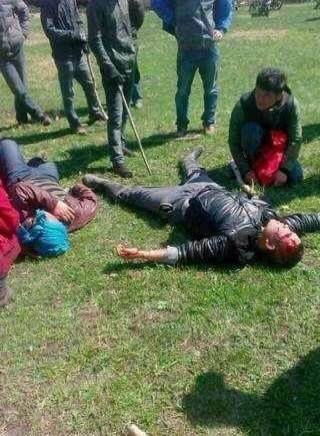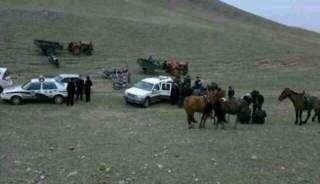Two years ago, the
brutal killing of a Mongolian herder in Right Uzumchin Banner sparked the
2011 large-scale protests by Mongolian herders and students throughout
Southern (Inner) Mongolia. A brutal attack by Chinese settlers again took
place in the same banner on May 17, 2013. A dozen Mongolian herders from
Saruulbulag Gachaa (a gachaa consists of several villages), Bayanhua
township of Right Uzumchin Banner were severely beaten as the herders
defended their grazing lands.
According to a written
communication and photos received by the Southern Mongolian Human Rights
Information Center (SMHRIC) from the local Mongolian community, more than a
hundred Chinese gathered to attack the Mongolian herders in Saruulbulag
Gachaa with sticks and stones. Photos show the beatings perpetrated by the
Chinese, as herders fell to the ground unconscious before they were taken
away by ambulance and police vehicles.
“This land belongs to
our Mongolian herders of Saruulbulag Gachaa,” the herders complained in
their written statement, “yet, they [the Chinese] brought in more than a
hundred individuals to attack us, injuring a dozen of our herders.”
“Not only that, they
also damaged our herders’ motorcycles and cars,” the complaint added.
Fearing a repeat of
the 2011 popular uprisings, the Chinese authorities launched a campaign to
manipulate public opinion and to neutralize the anger of the Mongolian
herders. They quickly removed posts and pictures of the incident from major
social media sites and mobilized their Internet censorship forces to post
essentially public relations messages stating that the authorities are
actively working to deal with the incident in a just manner.
“The so-called ‘case
of the beating of Right Uzumchin Banner herders’ posted by a handful of
netizens on Sina (“xin lang wei bo” in Chinese) and QQ sites on May 18 is in
fact an internal conflict. Both parties had Mongolian and Chinese
participants. The Chinese and the Mongolians had a fairly good
relationship,” a short press release was posted on Weibo, QQ and Baidu by
the Chinese Communist Party Right Uzumchin Banner Propaganda Department,
stating that the local authorities are “working either to reach an agreement
with the herders or to handle the case in accordance with the law.”
“The herders’ anger
has been appeased now. The case will be resolved shortly. Please trust the
government’s ability to administer and enforce the law. Just like a small
family quarrel between brothers, this will no doubt be resolved with a happy
handshake,” the statement ends with an effort to soften the impact of the
clashes by characterizing the incident as a “family quarrel between
brothers”.
Meanwhile, the Chinese
Internet police authorities acted promptly to warn and threaten those
netizens who posted messages or asked for more information on the case.
“Shut up, you liar!
Come over to Right Uzumchin Banner and see how everything is calm and
peaceful! Are you trying to carry out national separatism? Then stand up and
tell us your plan,” a post showed up on China's popular social media site
Baidu using the accusation of “national separatism” to threaten a
netizen who expressed his concern on the herders and grassland and asked not
to remove posts related to the case.
Tensions have
escalated rapidly in recent years between Mongolian herders and Chinese
miners and farmers as the authorities have intensified their land
expropriation in Southern Mongolia to expand mining and other development
projects. Herders’ protests have become commonplace in the Southern
Mongolian rural communities as they increasingly attempt to defend their
shrinking grazing lands against Chinese encroachments.
One such case
occurred as recently as three weeks ago. Mongolian herders of eastern
Southern Mongolia’s Ongniud Banner were attacked by more than a hundred
Chinese farmers. The conflict resulted from the refusal by the Chinese
settlers to return the herders’ grazing lands after their 10-year lease
period expired (See here for details:
http://www.smhric.org/news_483.htm )
Seven herders were severely
injured. One suffered brain injury and two were left with broken arms and
legs.









 Beyond
Great Walls: Environment, Identity, and Development on the Chinese
Grasslands of Inner Mongolia
Beyond
Great Walls: Environment, Identity, and Development on the Chinese
Grasslands of Inner Mongolia China's
Pastoral Region: Sheep and Wool, Minority Nationalities, Rangeland
Degradation and Sustainable Development
China's
Pastoral Region: Sheep and Wool, Minority Nationalities, Rangeland
Degradation and Sustainable Development The
Ordos Plateau of China: An Endangered Environment (Unu Studies on
Critical Environmental Regions)
The
Ordos Plateau of China: An Endangered Environment (Unu Studies on
Critical Environmental Regions)